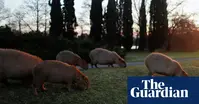A contraception debate is gripping one of Argentina's most notable luxury neighbourhoods – not for its wealthy residents, but for its original occupants, the capybaras.
In recent years, the lovable rodents have been accused of overrunning the Nordelta, a meticulously landscaped and manicured suburb north of Buenos Aires.
Now, in a bid to quell reproduction – some accounts suggest the number of capybaras has tripled to more than 1,000 in the past three years – the Buenos Aires government has approved wildlife population control plans, involving selective sterilisation and contraceptives.
Marcelo Cantón, a resident and spokesperson for the Nordelta Neighborhood Association, says that while capybaras themselves are not a problem, the "excessive growth" of their populations is, adding that it is causing the creatures to "fight among themselves, fight with dogs in private gardens", leading to traffic accidents.
"Capybaras have more than 500 hectares of lakes and public parks here, with no predators, no hunters to catch them for slaughter," he says. "There are none of the limits to population growth that exist elsewhere."
According to El País, the new plans would see two doses of contraceptives injected into 250 of the rodents, known locally as carpinchos, which authorities hope will stem reproduction for up to a year.
But not all neighbours are in agreement. The Nordelta sits within the Paraná Delta, an environmentally important wetland home to dense flora, an abundance of birds and dozens of species of mammals.
Silvia Soto and a group of neighbours known as "Nordelta Capybaras – We Are Your Voice" say the plans should be halted, dispute that there is an overpopulation problem and criticise property developers for ignoring proposals to create biological corridors and protected areas.
"For years, we have been asking for different, linked green areas that function as natural reserves connected by biological corridors, to protect the capybaras and preserve their survival and coexistence in their own natural space," Soto said, adding that the group's surveys had "not been taken into account".
Environmentalists are also now weighing in and calling on the government to protect the capybaras, which are the world's largest rodent, and the wetlands.










Jump in the discussion.
No email address required.
Snapshots:
https://www.theguardian.com/world/2025/feb/16/buenos-aires-argentina-capybaras:
ghostarchive.org
archive.org
archive.ph (click to archive)
Jump in the discussion.
No email address required.
More options
Context